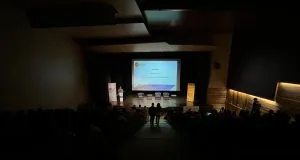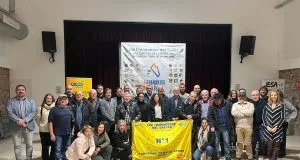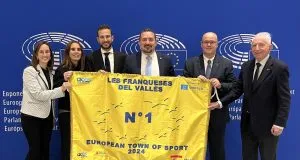Fifteen speakers from across the country reflect in Les Franqueses on sustainability and its future challenges in the world of sports.
The Bellavista Auditorium Theatre hosted this Wednesday the 3rd Catalan Congress on Sports Management organized by the Catalan Association of Sports Management (ACGEP), which this year was held in Les Franqueses del Vallès as part of the European Village of Sport 2024 framework. A congress that brought together nearly 200 people and fifteen speakers from across the country reflecting under the premise ‘Sports management and sustainability, a vital tandem’.
The day began with a welcome from the president of the ACGEP, Josep Campaña, who wanted to raise the curtain on the congress by recalling the objectives of the association he presides over. ‘Our objectives include opening the association, engaging with local areas, and fostering new talent. In this sense, we are pleased today with the presence of students from the Advanced Sports Degree of the Lauro Institute of Les Franqueses and the Ginebró School of Llinars del Vallès.” The president of the Federation of Sports Management Associations of Spain (FAGDE), Fernando París, also took the stage to welcome the attendees, emphasizing that “the ACGEP has always been a driving force for the FAGDE” and expressing gratitude for the invitation to the congress. Institutionally, the councillor for sports of Les Franqueses, Carlos Munzón Cruz, and the Secretary General for Sport and Physical Activity of the Generalitat, Abel Garcia, welcomed the attendees. Both agreed on highlighting the sporting strength of Les Franqueses del Vallès and the importance of hosting the European Village of Sport this year, becoming the best European Village of Sport for 2024.
The 3rd Catalan Congress on Sports Management was divided into four major thematic blocks. Ana Vallejo, from MQ Sostenible & Green Events, opened the first block, ‘Sport in evolution: Innovation and sustainability as keys to change.’ The expert and sustainability consultant reflected on the waste generated in the world of sports and the need to raise awareness. She also argued that sustainability is impossible without a budget to achieve it. Vallejo also emphasized the need to decarbonize society due to the risks posed by the ecological footprint.
Juanma Murua, from Murua: Sport & Innovation, took over with a talk titled ‘AI and sport: sustainability or paradox?’. Murua reflected on the use of AI in the world of sports and, above all, wanted to explore the predictive use of data to optimize resources and become more sustainable.
The second block, ‘Sport in harmony with the environment: Towards more sustainable facilities and spaces,’ was opened by Mario Bravo and Helena Berlanda, from the Barcelona Provincial Council, who aimed to raise awareness about the importance of optimizing resources, whether talking about energy or water. They also emphasized the need to monitor savings to raise awareness. In this regard, Mario Bravo wanted to share exclusive news: according to his explanation, the Barcelona Provincial Council and the UPC are investigating how to reuse shower water, which represents the highest expense in sports centers. A study is being conducted in Badalona and will present results next year.
Next, it was Montserrat Centellas, from INDESCAT, the Catalan cluster of sports industries, who took the floor to explain the importance of gathering all information and having the ability to share it. Centellas shared INDESCAT’s experiences working with sustainability and invited attendees to take a look at the sustainability guide edited by INDESCAT.
The third block, ‘Innovation in action: Experiences in sustainable management,’ discussed some success stories in sustainability management in the sports world. Architect and founding partner of AIA, Albert Salazar, provided some keys to sustainability focused on sports facilities. On one hand, thinking about the impact of construction materials, on the other, responsibly managing water, and finally, clearly betting on renewable energies.
A reflection that led to a roundtable with three success stories. That of the Terrassa Swimming Club, with Francesc Francolí at the helm, who explained their decarbonization plan, which allowed them to save between 800,000 and 1 million euros. Ester Benach, from the Claror Foundation, also shared their commitments to the Sustainable Development Goals (SDGs). Lastly, Adrià Salvans, from the Royal Polo Club of Barcelona, spoke about the digitalization of water supply.
An initiative of the Royal Polo Club of Barcelona that was praised by Sergio Sánchez, from Banc de Sabadell, one of the last three speakers of this 3rd Catalan Congress on Sports Management and participant in the roundtable of the final block, titled ‘Green Funds: opportunities to finance Sustainable Sports Management.’ Sánchez explained that this project would obtain funding from Banc Sabadell because it meets the requirements as a sustainable project. Also participating in this last roundtable were Mireia Huerta, from the Catalan Association of Municipalities, who explained the importance of distinguishing where all European funds come from, and Enrique Zaragoza, from Fairplaid crowdfunding, who emphasized the importance of crowdfunding in sustainability projects. They all agreed on the difficulty of bureaucracy in obtaining funding for sustainable projects.




